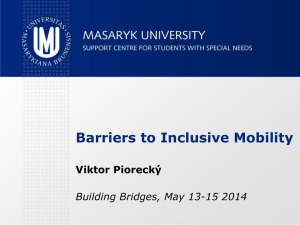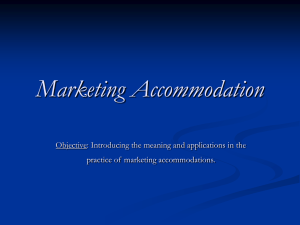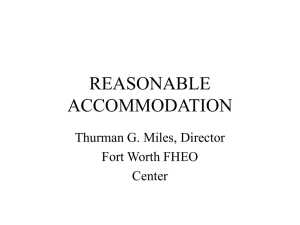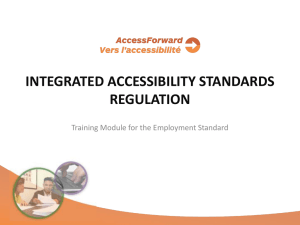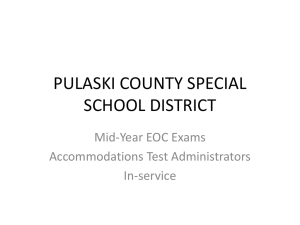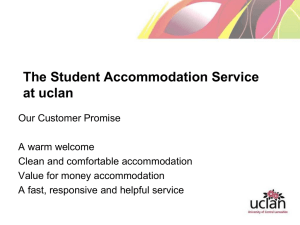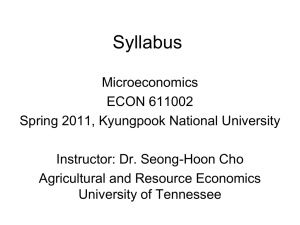expectations of student accommodation
advertisement
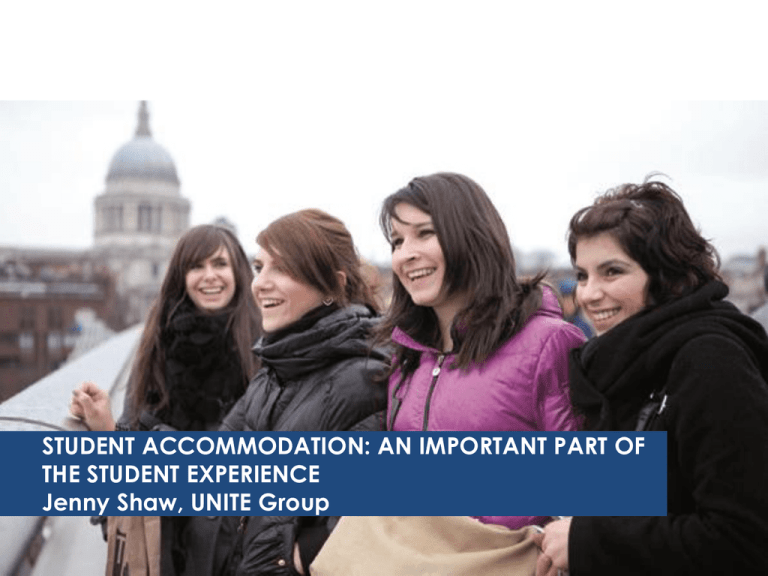
STUDENT ACCOMMODATION: AN IMPORTANT PART OF THE STUDENT EXPERIENCE Jenny Shaw, UNITE Group STUDENT ACCOMMODATION: A HISTORY 1945-1970s • • • • • HE sector grows – but • growth in accommodation outpaces it Learning in a • residential academic community “Civilising” – cultural and professional • norms Moral/religious approach to pastoral care, e.g. wardens Enabled by grants 1970s-1990s HE sector expansion – but sector investment in accommodation retained Lowered age of majority – lowered need for pastoral care Living away from home “rite of passage” into adulthood – shared houses 1990s • • • • • HE sector massification – sector investment in accommodation can’t keep pace New universities without their own accommodation stock Student accommodation as a commercial venture – higher spec halls Expanded HiMO sector (buy-to-let available) Private halls WHAT DOES EXISTING RESEARCH TELL US? ASPECTS OF THE STUDENT EXPERIENCE SELF ACUTALISATION ESTEEM BELONGING SAFETY PHYSIOLOGICAL WHAT IS IMPORTANT? Sources of stress: Noise; inability to study; inability to sleep; conflict with other students; having to maintain good relationships in difficult situations (Dusselier et al, 2005; Audin, 2003) What makes a difference: Management approach; in-house source of pastoral support; issues resolved (Royal College of Psychiatrists, 2011; Crouch et al, 2007) SAFETY PHYSIOLOGICAL WHAT IS IMPORTANT? All students Happiness with other students important to wellbeing (Audin, 2003) Programme of social events promotes community (Paltridge et al, 2010) Student engagement/interaction can increase persistence (Naylor, 2009) 7% of students report being bullied (Coleyshaw, 2010) BELONGING International students / minority groups Management actions and policies important in preventing students feeling like outsiders (Paltridge et al, 2010; Harwood et al; 2012) WHAT IS IMPORTANT SELF ACUTALISATION ESTEEM Experience of accommodation can impact on academic success, positively and negatively (e.g. Pat-Mbano et al, 2012; Pascarella & Terenzini, 2005; Thomas, 2002; Loots, 2009) Students placed on the same floor as others studying the same subject do better academically (Smith, 2010) Students who have structured interactions with students from different backgrounds may have better academic outcomes and employability skills (Gurin et al, 2002; Hu & Kuh, 2003) WHAT DID 2012 APPLICANTS WANT? DO FEES CHANGE EXPECTATIONS? Academic facilities and student accommodation are expected to improve. Base: 404 Student Experience Research January 2012 EXPECTATIONS OF STUDENT ACCOMMODATION Base: 282 Accommodation expectations are basic but it should be good quality, clean, modern and safe. The cost of accommodation is also important. Student Experience Research January 2012 EXPECTATIONS OF STUDENT ACCOMMODATION I only really value liveable space. I do not demand much in the way of luxury for living space and so will seek the cheapest student accommodation so that money can be spent on other things. Single room. Not bothered about sharing a bathroom. So that I can feel safe in the environment, and if it is great accommodation, I can concentrate more, as the Very important that all first environment will be good I would want the university accommodation to be good enough so that I think that I'm living in a second home. If I've come back from a hard days work to accommodation which is not desirable then I wouldn't be happy and may end up resenting the university. Also, if I wanted to study in my university dorm room then I'd prefer to have a nice room. Modern (ish), bright (makes all the difference), appropriate facilities in good condition (ie kitchen appliances, bathroom etc), not sharing a bath/ shower/ toilet with more than 2 or 3 other people, feeling secure but not massively strict rules years are integrated. Accommodation has a great deal to do with this. Many of my friends have left uni because they feel alienated by difficulty of integrating due to situation / type of accommodation. This would mean a lot because I'd want to be living in a safe and clean place. I don’t want to be living somewhere with worry knowing that something could go wrong anytime and not put my focus on education. Q23 Base: 424 Q24 Base: 408 WHAT’S ACTUALLY HAPPENING? OLD EXPECTATIONS Social programme Welfare programme Employability Personal development Added value A place to stay Clean, well maintained etc. Hygiene factors NEW EXPECTATIONS Employability Personal development A place to stay Clean, well maintained etc. Social programme Welfare programme Added value Hygiene factors DISTINCTIVENESS Highly nurturing environment with singlesex corridors and strong policies on noise, visitors etc. Embedded and proactive student services. Vibrant, multicultural environment with an emphasis on communal space. ResLife being rolled out. Student services mainly reactive and centralised. No university-owned accommodation but strong pastoral support across third-party contracts. Room allocations made on the basis of developing a balanced community. Additional support for students identified as vulnerable. Traditional halls model with high emphasis on student engagement. All social events and some pastoral work via JCRs. Resident wardens who are senior academics and postgrads. Urban living with some halls allocation but a high reliance on private housing. Emphasis on vocational curriculum and employer engagement, with high proportion of local students. Student services are reactive. WHAT’S NEXT? HOW HAVE THINGS CHANGED? 1945 2012 Moral guardian ‘Civilising’ Employability Social norms for professions Citizenship Academic skills Graduateness Scholarly community Minors Adults Extended adolescence? WHAT NEXT? • Extended adolescence - Wellbeing • HE market - Distinctiveness • Can accommodation add value in terms of: Internationalisation Global citizenship Personal development Academic development Student engagement

